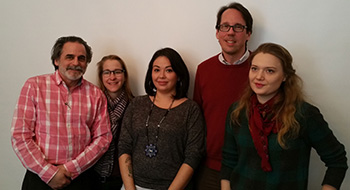Before and after images show destruction that has already occurred as construction of Site C dam presses ahead
Indigenous activist explains the importance of halting the Site C dam
 When Helen Knott talks about the importance of the Peace Valley, she inevitably also talks about her grandmother. About time spent together out on the land, learning the stories that have been passed down through the generations. Learning the skills of how to live on the land. And trying to ensure that this knowledge can be passed on to her own son.
When Helen Knott talks about the importance of the Peace Valley, she inevitably also talks about her grandmother. About time spent together out on the land, learning the stories that have been passed down through the generations. Learning the skills of how to live on the land. And trying to ensure that this knowledge can be passed on to her own son.
“All my grandmother’s stories are connected to land,” says Helen. “It’s like that for our elders. You have to be on the land to be able to share those memories.”
Today, the land itself is under threat. Rampant resource development has despoiled much of northeastern BC where the Dene Tsaa, Cree and Metis peoples hunt, fish and gather medicines and berries. A long stretch of the Peace Valley west of Fort St. John provides some of the few remaining areas where Indigenous peoples can freely go out on the land to live their cultures. And now that remaining section of the valley is threatened by the construction of a massive hydro-electric dam called ‘Site C.’
One of the largest resource development projects anywhere in Canada, the Site C dam would turn more than 80 km of the Peace River into a reservoir, drowning its islands and inundating its tributaries.
 |
| Helen Knott, center, with Ed Bianchi, KAIROS; Julie Delahanty, Oxfam Canada; Craig Benjamin, Amnesty International Canada; and Sarah McCue, Canadian Federation of Students |
The West Moberly and Prophet River First Nations have challenged the dam in court, arguing that it violates rights protected by treaty. Despite these legal challenges, BC Hydro has pressed ahead with clearing the site for construction. A culture camp established by Indigenous and non-Indigenous community members, including Helen, is the only thing standing in the way of further clearcutting.
Helen’s great-great grandfather signed Treaty 8 in 1911. The original intent, Helen says, was for Indigenous and non-Indigenous people to be able live side by side while protecting the culture, traditions and identity of First Nations. By standing up against the Site C dam, Helen says that she is honouring the original intent of the Treaty.
This week, Helen came to Ottawa to urge Prime Minister Justin Trudeau and his government to do the same:
“If Prime Minister Trudeau truly wants to build a new relationship based on respect for our rights,” says Helen,”He needs to act immediately to withdraw all federal support to the flooding of our land by the Site C dam.”
Last week, more than 25 organizations from across Canada wrote to the Prime Minister calling for all federal permits for Site C to be immediately rescinded. Many of these organizations were able to meet with Helen this week during her visits to Toronto and Ottawa. It was a powerful moment to reaffirm our commitment to standing with her and the First Nations of the Peace Valley in demanding that Canada honour the treaties.
Next week, BC Hydro will be in court to try to get an injunction to shut down the cultural camp run by the Treaty 8 Stewards of the Land so that logging can resume. It’s now more urgent than ever that the federal government step in and ensure that treaty rights are protected.
>> TAKE ACTION: Tell the Trudeau government to Halt Site C immediately
LEARN MORE:
Joint letter:
http://www.amnesty.ca/news/theres-nothing-clean-about-site-c-dam
Public statement by the Treaty 8 Stewards of the Land:
http://www.amnesty.ca/…/peace-valley-british-columbia-respe…
Helen Knott’s blog posts:
https://reclaimthewarrior.wordpress.com/





















